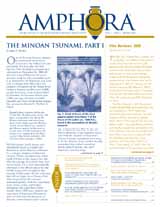Salvete,
Last night I decided today was as good as any to start migrating to our new digs. For those of you visiting via the 'direct route', please update your bookmarks etc. to:
http://rogueclassicismus.wordpress.com/
... which is what I had to use to get into wordpress due to technical difficulties, or you can use our new domain name:
http://rogueclassicism.com/
... which should get you there as well.
Those of you coming via an rss reader of some sort should change the address to:
http://rogueclassicismus.wordpress.com/feed/
Last night I decided today was as good as any to start migrating to our new digs. For those of you visiting via the 'direct route', please update your bookmarks etc. to:
http://rogueclassicismus.wordpress.com/
... which is what I had to use to get into wordpress due to technical difficulties, or you can use our new domain name:
http://rogueclassicism.com/
... which should get you there as well.
Those of you coming via an rss reader of some sort should change the address to:
http://rogueclassicismus.wordpress.com/feed/











